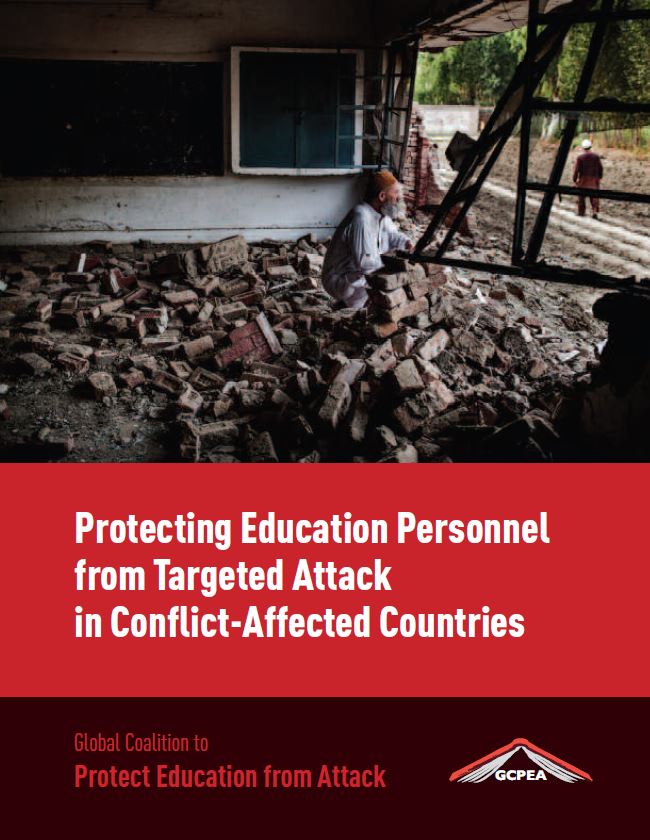GCPEA News
New report shows educators are targets in armed conflict
Education International, July 16, 2014
Attacks on teachers and other educators are a disturbingly common tactic of war and a serious threat to education, the Global Coalition to Protect Education from Attack (GCPEA) says in a new study released on 14 July. The report, Protecting Education Personnel from Targeted Attack in Conflict-Affected Countries, describes how teachers have been targeted around the world and documents various ways communities have tried to keep them safe.
GCPEA is a coalition of international organisations, including the Council for At-Risk Academics, Human Rights Watch, the Institute of International Education’s Scholar Rescue Fund, Protect Education in Insecurity and Conflict, Save the Children International, the Scholars at Risk Network, UNESCO, UNHCR, and UNICEF.
“On Malala Day, we should also remember the courage of teachers, like Malala’s father, who too often place their lives at risk simply by going to work and doing their job,” said Diya Nijhowne, GCPEA’s director. “Attacks on teachers strike at the very heart of a community, and more must be done to protect them.”
Guidance on strategies to protect teachers
The 50-page report documents the extent of attacks on teachers, the motives behind these attacks, and the strategies used to protect them. It also offers guidance to practitioners and policymakers on what they can do to help improve teachers’ security.
It draws from interviews with global practitioners, documents from international and local organisations, and field research in the Philippines. It highlights the devastating impact of violence against educators on the education system. Attacks can deplete the teaching force, as teachers and professors are intimidated, injured, killed, or forced to flee. In the longer term, they can exacerbate teacher shortages, disrupt education and employment cycles, and impact a country’s development.
Over the last five years, teachers and other education staff have been targeted for assassination, killed, injured, tortured, detained, extorted, and harassed in areas of conflict and instability in at least 23 countries, according to the GCPEA report, Education Under Attack 2014.
Malala support for kidnapped Nigerian schoolgirls
In Nigeria, for example, where the Islamist militant group, Boko Haram, abducted almost 300 schoolgirls last April, the President of the EI affiliate, the National Union of Teachers, reported that the group had also killed 171 teachers since 2009. A social media campaign, #bringbackourgirls, drew considerable worldwide support for the abducted girls.
On a visit to Nigeria, Malala Yousafzai, the Pakistani teenager shot in the head by the Taliban for championing the right of girls to education, pledged to help free a group of more than 200 of these schoolgirls still held captive.
The activist, turning 17 on 14 July, also held an early birthday celebration with some of the girls who escaped the mass abduction in the north-eastern village of Chibok.
“I can see those girls as my sisters… and I’m going to speak up for them until they are released,” she said during a meeting on 13 July with some of the parents of the abducted children in the capital, Abuja. “I’m going to participate actively in [the] Bring Back Our Girls campaign to make sure that they return safely.”
Boko Haram’s half-decade battle to impose an Islamic caliphate in Africa’s most populous nation has become increasingly bloody in the last year. Civilians have increasingly been targeted and, last year, the insurgents burned dozens of schoolchildren alive in their dorms. Pakistan and Nigeria have some of the highest numbers of children out of school. In Nigeria, girls make up around two-thirds of the 10.5 million outside the school system.
EI: Governments must help keep teachers safe
“Teachers play a crucial role in enlightening and inspiring the next generation of citizens and community leaders,” said EI General Secretary Fred van Leeuwen. “For the sake of their children, their societies, and their future, it is imperative that Governments raise their efforts and resources to keep teachers safe.”
He went on to emphasise that EI has been advocating for many years for schools to be acknowledged as safe sanctuaries in cases of armed conflicts.
You can read the full GCPEA report here





